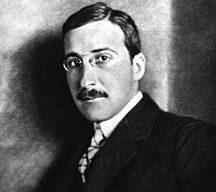Buchmendel
Buchmendel is a 1929 short story by the Austrian writer Stefan Zweig. It tells the tragic story of an eccentric but brilliant book peddler, Jakob Mendel, who spends his days trading in one of Vienna's many coffeehouses. With his encyclopaedic mind and devotion to literature, the Poland-born Russian-Jewish immigrant is not only tolerated but liked and admired by both the owner of his local Café Gluck and the cultured Viennese clients with whom he interacts in the pre-war period. In 1915, however, he is falsely accused of collaborating with Austria's enemies and is dispatched to a concentration camp. On his return, towards the end of the war, everything has changed. His mind no longer remembers, his eyes can no longer read, the café undergoes new, brittle ownership, and his clientele have disappeared. Jacob Mendel finally dies, destitute, incapacitated and forgotten.
What initially reads as another of the many modest human dramas that Zweig made his speciality, this small tale actually has a far more panoramic sub-plot, for it is a metaphor of World War I's impact on Viennese life and culture. It is also particularly interesting to the historian for understanding the strategies by which post-war writers re-imagined pre-war Vienna, how they conceptualised the war itself, and how memory and myth deeply influenced their conception of history.
Footnotes
References
- Librizzi, Jane. "Stefan Zweig: The Willingness To Tell Stories - Book Reviews by Jane Librizzi". Onondaga Count Public Library. Archived from the original on 12 October 2007. Retrieved 2006-12-08.
- Zweig, Stefan (1929). Buchmendel (1998 (English) ed.). Pushkin Press, London.
- PushkinPress.com English editions of Stefan Zweig's novellas
- Jewish Legends. New York : M. Wiener, 1987. (Includes, in order: The buried candelabrum; Rachel arraigns with God; The legend of the third dove; Virata, or, The eyes of the undying brother; Buchmendel)
| ||||||||||||
